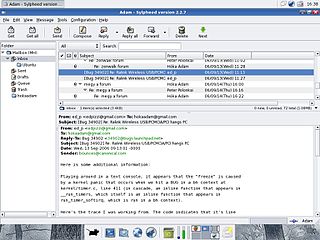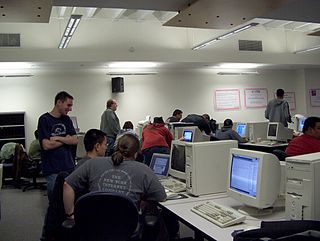
The Z shell (Zsh) is a Unix shell that can be used as an interactive login shell and as a command interpreter for shell scripting. Zsh is an extended Bourne shell with many improvements, including some features of Bash, ksh, and tcsh.
Plug, PLUG, plugs, or plugged may refer to:

Sylpheed is an open-source e-mail client and news client licensed under GNU GPL-2.0-or-later with the library part LibSylph under GNU LGPL-2.1-or-later. It provides easy configuration and an abundance of features. It stores mail in the MH Message Handling System. Sylpheed runs on Unix-like systems such as Linux or BSD, and it is also usable on Windows. It uses GTK+.

The SCO Group was an American software company in existence from 2002 to 2012 that became known for owning Unix operating system assets that had belonged to the Santa Cruz Operation, including the UnixWare and OpenServer technologies, and then, under CEO Darl McBride, pursuing a series of high-profile legal battles known as the SCO-Linux controversies.

A virtual file system (VFS) or virtual filesystem switch is an abstract layer on top of a more concrete file system. The purpose of a VFS is to allow client applications to access different types of concrete file systems in a uniform way. A VFS can, for example, be used to access local and network storage devices transparently without the client application noticing the difference. It can be used to bridge the differences in Windows, classic Mac OS/macOS and Unix filesystems, so that applications can access files on local file systems of those types without having to know what type of file system they are accessing.

Yggdrasil Linux/GNU/X, or LGX, is an early Linux distribution developed by Yggdrasil Computing, Incorporated, a company founded by Adam J. Richter in Berkeley, California.
In Unix and Unix-like computer operating systems, a file descriptor is a process-unique identifier (handle) for a file or other input/output resource, such as a pipe or network socket.

A pluggable authentication module (PAM) is a mechanism to integrate multiple low-level authentication schemes into a high-level application programming interface (API). PAM allows programs that rely on authentication to be written independently of the underlying authentication scheme. It was first proposed by Sun Microsystems in an Open Software Foundation Request for Comments (RFC) 86.0 dated October 1995. It was adopted as the authentication framework of the Common Desktop Environment. As a stand-alone open-source infrastructure, PAM first appeared in Red Hat Linux 3.0.4 in August 1996 in the Linux PAM project. PAM is currently supported in the AIX operating system, DragonFly BSD, FreeBSD, HP-UX, Linux, macOS, NetBSD and Solaris.
In a series of legal disputes between SCO Group and Linux vendors and users, SCO alleged that its license agreements with IBM meant that source code IBM wrote and donated to be incorporated into Linux was added in violation of SCO's contractual rights. Members of the Linux community disagreed with SCO's claims; IBM, Novell, and Red Hat filed claims against SCO.

SCO v. Novell was a United States lawsuit in which the software company The SCO Group (SCO), claimed ownership of the source code for the Unix operating system. SCO sought to have the court declare that SCO owned the rights to the Unix code, including the copyrights, and that Novell had committed slander of title by asserting a rival claim to ownership of the Unix copyrights. Separately, SCO was attempting to collect license fees from Linux end-users for Unix code through their SCOsource division, and Novell's rival ownership claim was a direct challenge to this initiative. Novell had been increasing their investments in and support of Linux at this time, and was opposed to SCO's attempts to collect license fees from Novell's potential customers.
Interix was an optional, POSIX-conformant Unix subsystem for Windows NT operating systems. Interix was a component of Windows Services for UNIX, and a superset of the Microsoft POSIX subsystem. Like the POSIX subsystem, Interix was an environment subsystem for the NT kernel. It included numerous open source utility software programs and libraries. Interix was originally developed and sold as OpenNT until purchased by Microsoft in 1999.
Caldera OpenLinux (COL) is a defunct Linux distribution. Caldera originally introduced it in 1997 based on the German LST Power Linux distribution, and then taken over and further developed by Caldera Systems since 1998. A successor to the Caldera Network Desktop put together by Caldera since 1995, OpenLinux was an early "business-oriented distribution" and foreshadowed the direction of developments that came to most other distributions and the Linux community generally.
The Portland Project is an initiative by freedesktop.org aiming at easing the portability of application software between desktop environments and kernels by designing cross-platform APIs and offering implementations thereof as libraries to independent software vendors (ISVs).

Linux is both an open-source Unix-like kernel and a generic name for a family of open-source Unix-like operating systems based on the Linux kernel, an operating system kernel first released on September 17, 1991, by Linus Torvalds. Linux is typically packaged as a Linux distribution (distro), which includes the kernel and supporting system software and libraries, many of which are provided by the GNU Project.
Linux Pluggable Authentication Modules (PAM) is a suite of libraries that allow a Linux system administrator to configure methods to authenticate users. It provides a flexible and centralized way to switch authentication methods for secured applications by using configuration files instead of changing application code. There are Linux PAM libraries allowing authentication using methods such as local passwords, LDAP, or fingerprint readers. Linux PAM is evolved from the Unix Pluggable Authentication Modules architecture.

A Linux User Group or Linux Users' Group (LUG) or GNU/Linux User Group (GLUG) is a private, generally non-profit or not-for-profit organization that provides support and/or education for Linux users, particularly for inexperienced users. The term commonly refers to local groups that meet in person but is also used to refer to online support groups that may have members spread over a very wide area and that do not organize, or are not dependent on, physical meetings. Many LUGs encompass FreeBSD and other free-software / open source Unix-based operating systems.

A Unix-like operating system is one that behaves in a manner similar to a Unix system, although not necessarily conforming to or being certified to any version of the Single UNIX Specification. A Unix-like application is one that behaves like the corresponding Unix command or shell. Although there are general philosophies for Unix design, there is no technical standard defining the term, and opinions can differ about the degree to which a particular operating system or application is Unix-like.

Unix is a family of multitasking, multi-user computer operating systems that derive from the original AT&T Unix, whose development started in 1969 at the Bell Labs research center by Ken Thompson, Dennis Ritchie, and others.
The Application Programming Interface for Windows (APIW) Standard is a specification of the Microsoft Windows 3.1 API drafted by Willows Software. It is the successor to previously proposed Public Windows Interface standard. It was created in an attempt to establish a vendor-neutral, platform-independent, open standard of the 16-bit Windows API not controlled by Microsoft.










